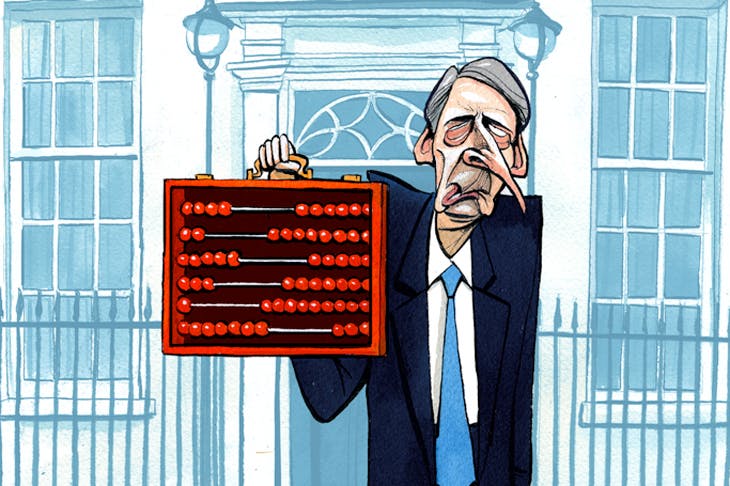Some Budgets are historic, most are boring and a small number can be remembered as a disaster. After just a few months, Philip Hammond has managed a budget – his first – that can be placed in this last category. Economically, it made very little difference. Politically, it is shaping up to be a disaster.
His Budget was supposed to have been conducted under the pledge, issued no fewer than four times in the 2015 Conservative manifesto, that his party not raise taxes. ‘Instead, we will ease the burden of taxation,’ the Tories promised. It seems plausible enough, and the Conservatives were returned with an absolute majority. Whatever else one might have thought about David Cameron, he had shown he was a Prime Minister who kept his promises.
But Mr Hammond has a more elastic approach to promises, and seems to stretch words like an accountant seeking a tax loophole. He wishes to splurge on infrastructure, and his instincts appear to favour larger rather than leaner government. A Chancellor in pursuit of higher government spending will have a hunger for other people’s money. It has led him to speak about the self-employed as if they are tax dodgers, are somehow using the NHS without paying for it properly. So there has been a fundamental change in the Conservative Party’s attitude since the general election: a promise not to raise taxes for the self-employed has been replaced by an agenda to target them.
So the self-employed – who now make up 15pc of workers – have been told that their National Insurance tax rate will rise by 2p in the pound. Mr Hammond spoke in technocratic language, saying it is an anomaly that the self-employed pay National Insurance at a lower rate than staff employees. Set aside the reasons for this (most self-employed have no holiday entitlement, sick leave or other benefits) this whole line of argument is one that the Tories pledged not to pursue. The Chancellor’s brazen disregard for these promises – and basic Conservative economic principles – is nothing short of extraordinary.
For a while now, MPs have been wondering what Mr Hammond and Theresa May would do with the historic political opportunity that lies before them. The Labour party is in disarray; never have the Conservatives been able to be more confident of winning the next general election. This is a time when the Tories could, if they chose, set the terms of debate. Given that nothing in politics ever stands still, this moment of opportunity will not last for long.
But there appears to be striking lack of Tory ideas. Mr Hammond has now delivered two Budget statements, both distinguished by a lack of broader ambition. We have been presented with a betrayal of a manifesto pledge and relatively small measures, here and there, to fix various problems. If Mr Hammond does have a distinctive agenda, other than the creeping continuation of Labour’s tax-and-spend policies, then we have seen precious little evidence of it so far.
He boasted during his speech about the Tories being the party of the NHS, as if this were the Tories’ appeal to Labour voters. That it is mutating into a higher-taxing, higher-spending party (he found £2 billion extra for social care). It makes sense to try to appeal to moderate Labour voters at a time when they are being abandoned by their party, but there must be a better way to do so. He could have pointed out that conventional Conservatism — lower taxes and bold welfare reform — has worked extraordinarily well.
So far, the Tory reforms have meant that it is the income of the lowest-paid which has risen the most, while the top earners have seen the biggest losses. The various warnings about austerity — that it would hit the poorest hardest — were wrong for a simple reason: welfare reform led more people into work, which improved their lot considerably.
All this was missed by critics who were fixated on Osborne’s reduction of the top rate of income tax from 50 per cent to 45 per cent. This change actually saw the share of tax from the best-paid rise. As Philip Hammond said in his Budget statement, the top 1 per cent now pay 27 per cent of all income tax collected. This is because his predecessor cut, rather than raised, taxes.
Where the Tories did summon the courage to apply Conservative principles, the result was not just more prosperity but a fairer society as well. Tory policies have ended up milking the rich in a way Labour has never managed — another triumph of what should be known as progressive conservatism. Even the Tories seem to treat this as a dirty secret. These policies pushed inequality down to a 30-year low — to date, no government member has made this point.
There has been another marked trend over the past few years, starting when Gordon Brown was chancellor. Successive budgets have seen tax policy swing towards favouring investment income over earned income. It was Brown who began hiking up National Insurance contributions in an effort to raise more revenue while sticking — in strict terms, at least — to his pledge not to increase the rate of income tax. It meant that people in work paid more while those living off their investments were unaffected.
Hammond has now continued that raid on the working population by increasing National Insurance contributions for the self-employed. Meanwhile, investment allowances have been generously increased. The amount which can annually be saved in an Individual Savings Account has gone from £15,240 to £20,000. In time, this will hugely boost the tax-free income available to be enjoyed by the retired. So taxes for workers will rise, while taxes on the asset rich (whose lot has already been greatly helped by quantitative easing) will fall. This makes a nonsense of government slogans to ‘make work pay’.
Getting Brexit right was always going to be the top priority of Theresa May’s government, but she also has an unprecedented opportunity to enact the kind of reforms that Tories are supposed to be in politics to achieve. Instead we have seen an unprincipled and unnecessary tax raid on the self-employed which penalises ambition and throws the Conservatives’ integrity into question.
Fiscally, this Budget was an irrelevance – his tax raid raised very little money. But politically, it has been an avoidable disaster which will make it hard for the Tories to make any more promises on tax. Mr Hammond has sold his party’s integrity at a very low price.
Got something to add? Join the discussion and comment below.
Get 10 issues for just $10
Subscribe to The Spectator Australia today for the next 10 magazine issues, plus full online access, for just $10.














Comments
Don't miss out
Join the conversation with other Spectator Australia readers. Subscribe to leave a comment.
SUBSCRIBEAlready a subscriber? Log in